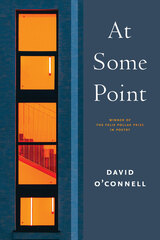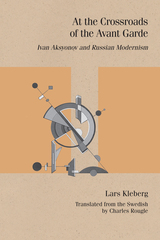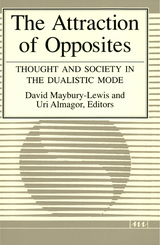5 books about Sound (Philosophy)
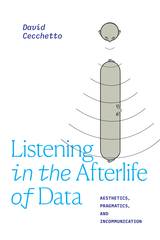
Listening in the Afterlife of Data
Aesthetics, Pragmatics, and Incommunication
David Cecchetto
Duke University Press, 2022
In Listening in the Afterlife of Data, David Cecchetto theorizes sound, communication, and data by analyzing them in the contexts of the practical workings of specific technologies, situations, and artworks. In a time he calls the afterlife of data—the cultural context in which data’s hegemony persists even in the absence of any belief in its validity—Cecchetto shows how data is repositioned as the latest in a long line of concepts that are at once constitutive of communication and suggestive of its limits. Cecchetto points to the failures and excesses of communication by focusing on the power of listening—whether through wearable technology, internet-based artwork, or the ways in which computers process sound—to pragmatically comprehend the representational excesses that data produces. Writing at a cultural moment in which data has never been more ubiquitous or less convincing, Cecchetto elucidates the paradoxes that are constitutive of computation and communication more broadly, demonstrating that data is never quite what it seems.
[more]
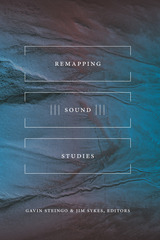
Remapping Sound Studies
Gavin Steingo and Jim Sykes, editors
Duke University Press, 2019
The contributors to Remapping Sound Studies intervene in current trends and practices in sound studies by reorienting the field toward the global South. Attending to disparate aspects of sound in Africa, South and Southeast Asia, Latin America, the Middle East, Micronesia, and a Southern outpost in the global North, this volume broadens the scope of sound studies and challenges some of the field's central presuppositions. The contributors show how approaches to and uses of technology across the global South complicate narratives of technological modernity and how sound-making and listening in diverse global settings unsettle familiar binaries of sacred/secular, private/public, human/nonhuman, male/female, and nature/culture. Exploring a wide range of sonic phenomena and practices, from birdsong in the Marshall Islands to Zulu ululation, the contributors offer diverse ways to remap and decolonize modes of thinking about and listening to sound.
Contributors
Tripta Chandola, Michele Friedner, Louise Meintjes, Jairo Moreno, Ana María Ochoa Gautier, Michael Birenbaum Quintero, Jeff Roy, Jessica Schwartz, Shayna Silverstein, Gavin Steingo, Jim Sykes, Benjamin Tausig, Hervé Tchumkam
Contributors
Tripta Chandola, Michele Friedner, Louise Meintjes, Jairo Moreno, Ana María Ochoa Gautier, Michael Birenbaum Quintero, Jeff Roy, Jessica Schwartz, Shayna Silverstein, Gavin Steingo, Jim Sykes, Benjamin Tausig, Hervé Tchumkam
[more]
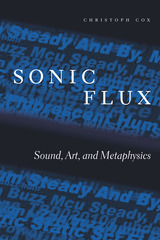
Sonic Flux
Sound, Art, and Metaphysics
Christoph Cox
University of Chicago Press, 2018
From Edison’s invention of the phonograph through contemporary field recording and sound installation, artists have become attracted to those domains against which music has always defined itself: noise, silence, and environmental sound. Christoph Cox argues that these developments in the sonic arts are not only aesthetically but also philosophically significant, revealing sound to be a continuous material flow to which human expressions contribute but which precedes and exceeds those expressions. Cox shows how, over the course of the twentieth and twenty-first centuries, philosophers and sonic artists have explored this “sonic flux.”
Through the philosophical analysis of works by John Cage, Maryanne Amacher, Max Neuhaus, Christian Marclay, and many others, Sonic Flux contributes to the development of a materialist metaphysics and poses a challenge to the prevailing positions in cultural theory, proposing a realist and materialist aesthetics able to account not only for sonic art but for artistic production in general.
Through the philosophical analysis of works by John Cage, Maryanne Amacher, Max Neuhaus, Christian Marclay, and many others, Sonic Flux contributes to the development of a materialist metaphysics and poses a challenge to the prevailing positions in cultural theory, proposing a realist and materialist aesthetics able to account not only for sonic art but for artistic production in general.
[more]
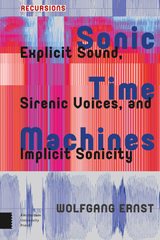
Sonic Time Machines
Explicit Sound, Sirenic Voices, and Implicit Sonicity
Wolfgang Ernst
Amsterdam University Press, 2016
Our studies of aesthetics and knowledge have long tended to privilege the visual - at the expense, Wolfgang Ernst argues, of the aural. Sonic Time Machines aims to correct that, presenting a striking new approach to theorising sound that investigates its split existence: as a temporal effect in a techno-cultural context and as a source of knowledge and information. Ernst creates a new term for the concept at the heart of the book, "sonicity," a flexible and powerful term that allows him to consider sound with all its many physical, philosophical, and cultural valences.
[more]
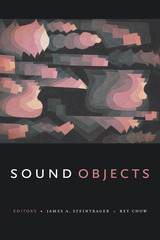
Sound Objects
James A. Steintrager and Rey Chow, editors
Duke University Press, 2019
Is a sound an object, an experience, an event, or a relation? What exactly does the emerging discipline of sound studies study? Sound Objects pursues these questions while exploring how history, culture, and mediation entwine with sound’s elusive objectivity. Examining the genealogy and evolution of the concept of the sound object, the commodification of sound, acousmatic listening, nonhuman sounds, and sound and memory, the contributors not only probe conceptual issues that lie in the forefront of contemporary sonic discussions but also underscore auditory experience as fundamental to sound as a critical enterprise. In so doing, they offer exciting considerations of sound within and beyond its role in meaning, communication, and information and an illuminatingly original theoretical overview of the field of sound studies itself.
Contributors. Georgina Born, Michael Bull, Michel Chion, Rey Chow, John Dack, Veit Erlmann, Brian Kane, Jairo Moreno, John Mowitt, Pooja Rangan, Gavin Steingo, James A. Steintrager, Jonathan Sterne, David Toop
Contributors. Georgina Born, Michael Bull, Michel Chion, Rey Chow, John Dack, Veit Erlmann, Brian Kane, Jairo Moreno, John Mowitt, Pooja Rangan, Gavin Steingo, James A. Steintrager, Jonathan Sterne, David Toop
[more]
READERS
Browse our collection.
PUBLISHERS
See BiblioVault's publisher services.
STUDENT SERVICES
Files for college accessibility offices.
UChicago Accessibility Resources
home | accessibility | search | about | contact us
BiblioVault ® 2001 - 2025
The University of Chicago Press


